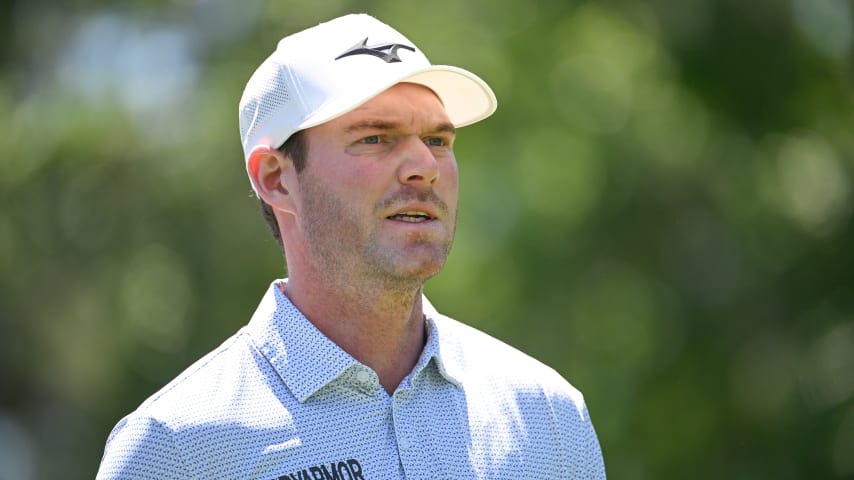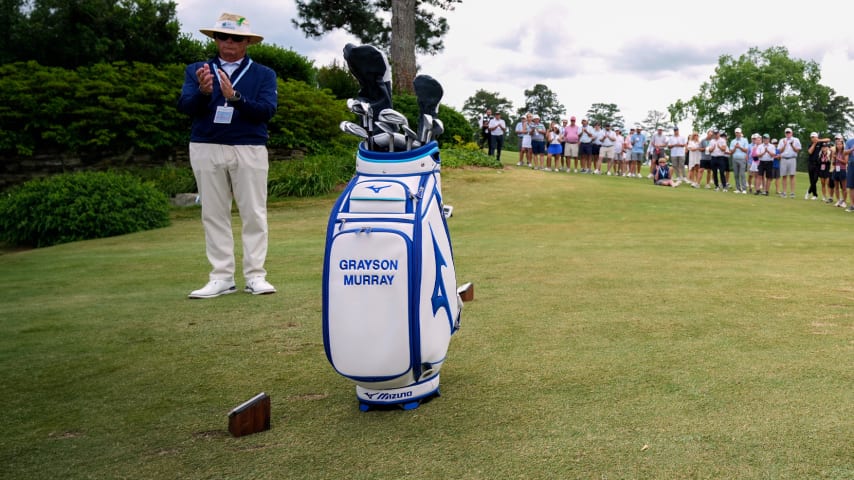Loss of Grayson Murray prompts reflection, reevaluation
4 Min Read

Grayson Murray died on May 25, 2024, at the age of 30. (Getty Images)
Written by Cameron Morfit
Grayson Murray’s death at age 30 is gut-wrenching and hard to accept whether you knew him, interviewed him, or cheered for him as he fought back against addiction and depression.
At this week’s RBC Canadian Open, players, caddies and other constituents were offered green ribbons for mental health awareness month, and pins provided by the Center for Addiction and Mental Health that remind, “Mental Health is Health.” Pens and cards were made available for players and caddies to write private messages to be sent directly to Murray’s family. Next week’s Memorial Tournament presented by Workday will include a ceremony honoring his life.
“It's incredibly sad,” Rory McIlroy said from Hamilton Golf and Country Club this week, “and everyone has to remember out here that we go out and we do things that a lot of people can't, but at the end of the day we're still human beings, and we're vulnerable and we're fragile, and I think if there's a lesson for anyone out there it's just to be kinder to each other.”
Harry Higgs said the same after winning the Korn Ferry Tour’s Visit Knoxville Open:
“Say something nice to someone you love. And also make it a point to say something nice to somebody you do not even know. … Everybody here could be a difference. The difference.”
That mandate feels urgent. Golf, sometimes insular to a fault, now joins the cultural conversation on how we might show up more meaningfully for others and in turn have them show up for us. David Brooks’ “How to know a person: The art of seeing others deeply and being deeply seen,” Charles Duhigg’s “Supercommunicators: How to unlock the secret language of connection,” and other titles serve up reams of research and action items.
“It is our responsibility to talk to each other more about real life, and less about our golf scores and upcoming bro trips,” golf photojournalist Jeff Marsh wrote in a widely shared thread on X in the aftermath of the Murray tragedy. “Lives depend on it.”
With addiction and depression, he added, it’s never easy. But what seems clear is that the biggest stage, to which so many aspire, can also be a lonely, unforgiving place, even for a player who won as recently as January at the Sony Open in Hawaii, as Murray did. Victor Dubuisson and, last week, Lexi Thompson cited loneliness as a reason for their early retirements. And social isolation and mental health are things we can at least begin to talk about.
Murray himself took the lead here. When I approached him at The RSM Classic at Sea Island, Georgia, late last year, he was bracingly candid in sharing his story. Others who interviewed him came away with a similar impression. It seemed that, like any of us, he just wanted to be seen. Unlike many of us, he was a public figure. It took something vulnerable and courageous to share his story, but he knew it might help someone else.
It did. Shortly after the Sony Open, one of my colleagues told me Murray’s tale was exactly what he needed to hear. When I relayed that to Murray, he seemed genuinely pleased. His vulnerability, and McIlroy’s use of the word Wednesday, are not a coincidence. More and more of us are using the V word, and living it, amid a concerning trend.
A 2021 report by the think tank Onward revealed that 22% of 18- to 34-year-olds had one, or no, close friends – more than triple the number from 2012 (7%). Compared to 20 years ago, under-35s are a third as likely to regularly speak to their neighbors, the report added. It's a troubling trend toward relational walls. Add the money and fame of a highly specialized, highly individuated profession like golf, and the walls can be high.
To begin to chip away at those walls will take intentionality. Religion, recovery groups, men’s and women’s groups, personal-growth retreats, therapy – grief counselors have been made available on TOUR – are all helpful. The how is less important than the now. It is a process of falling down and getting up, finding allies, falling again, feeling low, trusting that that feeling will pass like the weather, finding more allies, falling again, getting up, and white-knuckling the requisite trust and faith to know that none of this means we’re doing it wrong.
Some of us, despite having had every advantage, still fall apart with astonishing frequency. As Higgs reminded in his victory speech, it’s a hard world. Still, finding ballast in our connection to others is not impossible. “Supercommunicators” addresses this directly and prescriptively, pointing out on page 97, “Shallow questions can become deep.”
Instead of: Where do you live?
Try: What do you like about your neighborhood?
Instead of: Where did you go to high school?
Try: What advice would you give a high schooler?
Instead of: Are you married?
Try: Tell me about your family.
Delving into books and questions like this might feel foreign, but it will take something extra to cut through our distracted, overly busy tangle of earbuds and smartphones. Doing so can be part of the legacy of Murray, who seemed to be just getting started and impacted so many of us well before last weekend. It may be that the only wrong thing to do now is nothing.















